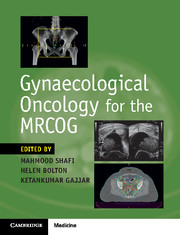Book contents
- Gynaecological Oncology for the MRCOG
- Gynaecological Oncology for the MRCOG
- Copyright page
- Dedication
- Contents
- Contributors
- Preface
- Abbreviations
- 1 Epidemiology of Gynaecological Cancers
- 2 Pathology of Gynaecological Cancers
- 3 Imaging in Gynaecological Oncology
- 4 Concepts of Treatment Approaches in Gynaecological Oncology
- 5 Radiation Therapy for Gynaecological Malignancies
- 6 Systemic Therapy in Gynaecological Cancers
- 7 Preinvasive Disease, Screening and Hereditary Cancer
- 8 Surgical Principles in Gynaecological Oncology
- 9 Role of Laparoscopic Surgery
- 10 Ovarian, Fallopian Tube and Primary Peritoneal Cancer (including Borderline)
- 11 Endometrial Cancer
- 12 Cervical and Vaginal Cancer
- 13 Vulval Cancer
- 14 Uterine Sarcomas
- 15 Non-epithelial Ovarian Tumours and Gestational Trophoblastic Neoplasia
- 16 Palliative Care
- 17 Living with Cancer
- 18 Communication in Gynaecological Oncology
- Appendix
- Index
17 - Living with Cancer
Published online by Cambridge University Press: 14 April 2018
- Gynaecological Oncology for the MRCOG
- Gynaecological Oncology for the MRCOG
- Copyright page
- Dedication
- Contents
- Contributors
- Preface
- Abbreviations
- 1 Epidemiology of Gynaecological Cancers
- 2 Pathology of Gynaecological Cancers
- 3 Imaging in Gynaecological Oncology
- 4 Concepts of Treatment Approaches in Gynaecological Oncology
- 5 Radiation Therapy for Gynaecological Malignancies
- 6 Systemic Therapy in Gynaecological Cancers
- 7 Preinvasive Disease, Screening and Hereditary Cancer
- 8 Surgical Principles in Gynaecological Oncology
- 9 Role of Laparoscopic Surgery
- 10 Ovarian, Fallopian Tube and Primary Peritoneal Cancer (including Borderline)
- 11 Endometrial Cancer
- 12 Cervical and Vaginal Cancer
- 13 Vulval Cancer
- 14 Uterine Sarcomas
- 15 Non-epithelial Ovarian Tumours and Gestational Trophoblastic Neoplasia
- 16 Palliative Care
- 17 Living with Cancer
- 18 Communication in Gynaecological Oncology
- Appendix
- Index
Summary
Living with Gynaecological Cancer
As oncological treatments for gynaecological malignancy have improved over the decades, associated with improved 1-, 3- and 5-year survival and a reduction in mortality, there has been an increased focus on the impact of disease and treatment modalities on quality of life (QOL). QOL is now a standard secondary outcome measure for all oncology clinical trials, recognising the balance of quantity and quality of the lives of cancer sufferers.
A number of clinical and research domains have evolved in response to this challenge, and it is important for specialist trainees in gynaecology to understand the basic principles, research fields and the medico-political agenda that have evolved during the past few decades.
In the United Kingdom, the Independent Cancer Taskforce was established in January 2015 by NHS England to develop a 5-year strategy for cancer services. The political importance of ‘living with cancer’ domain is evidenced by the Taskforce report (July 2015), detailing 96 recommendations for cancer services in England. One of the principal objectives for the NHS was to transform its approach to support people living with and beyond cancer, with a recommendation for national rollout of stratified follow-up pathways and the Recovery Package. The Recovery Package is an initiative championed by the cancer charity Macmillan, with the following four main interventions:
Holistic Needs Assessment and Care Planning
Treatment Summary
Cancer Care Review
Health and Well-being Events.
These elements form a part of an overall support and self-management package for people affected by cancer – physical activity as part of a healthy lifestyle, managing consequences of treatment, information, financial and work support. The Taskforce also recommended that a national QOL measure should be developed to ensure that the NHS is able to monitor and learn lessons to support people better in living well after the completion of treatment.
In this chapter we will cover the following topics:
• QOL as a multidimensional construct
• Measurement of QOL in clinical trials
• Cancer survivorship
• Patient reported outcome measures (PROMS) and survivorship
• Holistic care
• Sexuality
• Lymphoedema
• Fertility issues after gynaecological cancer treatment.
QOL as a Multidimensional Construct
Cancer and its treatment have a major impact on all facets of patients’ lives, frequently leading to difficulties in fulfilling family roles, the ability to work or participating in common social activities.
- Type
- Chapter
- Information
- Gynaecological Oncology for the MRCOG , pp. 179 - 187Publisher: Cambridge University PressPrint publication year: 2018

